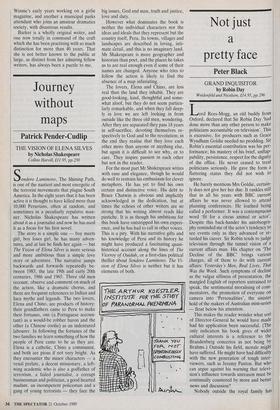Journey without maps
Patrick Pender-Cudlip
THE VISION OF ELENA SILVES by Nicholas Shakespeare
Collins Harvill, £11 .95, pp.250
S endero Luminoso, The Shining Path, is one of the nastiest and most energetic of the terrorist movements that plague South America. In the eight years that it has been active it is thought to have killed more than 10,000 Peruvians, often at random, and sometimes in a peculiarly repulsive man- ner. Nicholas Shakespeare has written about it as a journalist and now he has used it as a focus for his first novel.
The story is a simple one — boy meets girl, boy loses girl, he has many adven- tures, and at last he finds her again — but The Vision of Elena Silves is more serious and more ambitious than a simple love story or adventure. The narrative jumps backwards and forwards repeatedly be- tween 1983, the late 19th and early 20th centuries, 1986 and 1965. Three old men recount, observe and comment on much of the action, like a dramatic chorus, and there are frequent references to Indian and Inca myths and legends. The two lovers, Elena and Chino, are products of history: their grandfathers came to Peru to make their 'fortunes, one (a Portuguese accoun- tant) as a would-be robber baron and the other (a Chinese coolie) as an indentured labourer. In following the fortunes of the two families we learn something of how the people of Peru came to be as they are. Elena is a catholic, Chino a communist, and both are pious if not very bright. As they encounter the minor characters — a venal prelate, a decent missionary, a left- wing academic who is also a godfather of terrorism, a failed journalist, a corrupt businessman and politician, a good hearted madam, an incompetent policeman and a gang of young terrorists — they face the
big issues, God and man, truth and justice, love and duty.
However what dominates the book is neither the individual characters nor the ideas and ideals that they represent but the country itself, Peru. Its towns, villages and landscapes are described in loving, inti- mate detail, and this is no imaginary land. Mr Shakespeare is more geographer and historian than poet, and the places he takes us to are real enough even if some of their names are changed. Anyone who tries to follow the action is likely to find the absence of a map infuriating, The lovers, Elena and Chino, are less real than the land they inhabit, They are good-looking, kind, thoughtful and some- what aloof, but they do not seem particu- larly remarkable, and when they fall deep- ly in love we are left looking in from outside like the three old men, wondering. After they are separated they pass 18 years in self-sacrifice, devoting themselves re- spectively to God and to the revolution; in the end they realise that they love each other more than anyone or anything else, but again it is difficult to see why, or to care. They inspire passion in each other but not in the reader.
For the most part Mr Shakespeare Writes with ease and elegance, though he would do well to restrain his enthusiasm for clever metaphors. He has yet to find his own certain and distinctive voice. His debt to Bruce Chatwin is obvious and implicitly acknowledged in the dedication, but at times the echoes of other writers are so strong that his writing almost reads like pastiche. It is as though his ambitions for this book have outstripped his own experi- ence, and he has had to call in other voices. This is a pity. With his narrative gifts and his knowledge of Peru and its history he might have produced a fascinating quasi- historical account along the lines of The Viceroy of Ouidah, or a first-class political thriller about Sendero Luminoso. The Vi- sion of Elena Silves is neither but it has elements of both.


























































 Previous page
Previous page